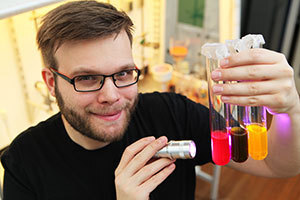by
Nancy Ryerson, Staff Writer | May 14, 2013

Researcher Thomas Just Sorensen
Danish researchers say they have discovered a contrast agent that lasts 10 times longer than traditional agents, allowing for a dramatic decrease in image background noise.
The University of Copenhagen team has had several studies published recently on the new agent in a variety of journals.
The researchers were inspired by the common problem of background "noise" from light in many images created using contrast agents. When exposed to light, tissues and other organic substances become illuminated for 10 nanoseconds. The "light-life" of contrast agents is the same, making background noise an issue in some scans.



Ad Statistics
Times Displayed: 138164
Times Visited: 7976 MIT labs, experts in Multi-Vendor component level repair of: MRI Coils, RF amplifiers, Gradient Amplifiers Contrast Media Injectors. System repairs, sub-assembly repairs, component level repairs, refurbish/calibrate. info@mitlabsusa.com/+1 (305) 470-8013
The new contrast agent, aza-oxa-trangulenium, lasts 100 nanoseconds. Aza-oxa-trangulenium eliminated more than 96 percent of autofluorescence, the unwanted light, in the research team's paper, published in the journal "Analytical and Bioanalytical Chemistry."
Researchers say the extra 90 nanoseconds mean that a "living image" of processes like a drug attacking an illness can begin to be created.
They also say the new dye will be cheaper than the commonly used ones, and that no special equipment beyond a "pair of polarized sunglasses and an ordinary microscope" will be needed to view the images the contrast agents create.
Intrigued physicians don't need to wait for the dyes to become commercially available. Currently, the dye is available to anyone who wants to try it, free of cost.
"I know that our dye is better, but biologists and physicians don't," said researcher Thomas Just Sorensen in a press release. "Therefore, we are giving the dye away to anyone that wants to perform a comparison test."

